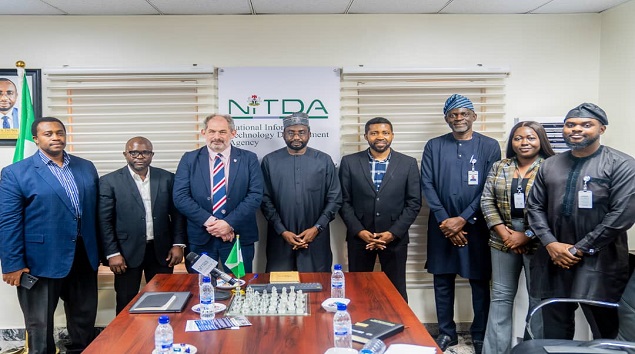General News
FG Begins ISPS Code Implementation
Sen. Idris Umar, minister of Transport said the the Federal Government has commenced the implementation of the International Ships and Ports Facilities Security (ISPS) Code in the ports nationwide.
The ISPS is an amendment to the Safety of Life at Sea (SOLAS) Convention (1974/1988) on minimum security arrangements for ships, ports and government agencies.
Having come into force in 2004, it prescribes responsibilities to governments, shipping companies and port/facility personnel to “detect security threats and take preventive measures against security incidents affecting ships or port facilities used in international trade.
Mrs. Yetunde Sonaike, deputy director, press and protocol, in the Ministry quoted the minister as saying that the implementation of the code became necessary so that Nigeria’s ports system would be safe and secured for the benefit of Nigerians and foreign investors in the maritime industry.
“Nigeria is a country that depends solely on oil; making the ports safe is of paramount interest to the present administration,” it added.
He said the appointment of the Nigeria Maritime Administration and Safety Agency (NIMASA) as the designated authority was part of the measures to address the identified gaps.
“Most process in dealing with the identified gaps would have commenced but not visible yet because of due process involved in implementing them,” he said.
Some officials of the U.S. Coast Guard (USCG) recently visited the minister to discuss the ISPS code.
The USCG delegation, led by Mr Tivo Romero, was in the country to ascertain the level of Nigeria’s compliance with ISPS code after the expiration of 90-day ultimatum given to the Federal Government by the USCG.
General News
NITDA DG says its Community IT Centres Should be a Catalyst of Change

Kashifu Inuwa Abdullahi, director general of National Information Technology Development Agency (NITDA) has said that the 18 community IT centre the agency has built in the past two years are meant to be a beacon of calls and catalyst of change in those communities where they are cited.

He sated this at the commissioning/handing over of IT centre at Akesan area in Lagos. He noted that the IT centres, Innovation hubs among others are part of digital literacy programme of the agency.
“This center is designed and build to help Akesan community to be part of the digital economy, because the President is big and loud when it comes to national prosperity and inclusivity.
“Our target is to build more than 1600 across the country. We want every community every Nigerian to be part of this national prosperity and inclusivity when it comes to digital economy.
“Today, we are here to commission it, to ensure and encourage you to put it in a good use, because we call it a community center means that we want everybody to be part of it. We don’t want it to be suited in a school where the school will lock it for only students and the staff.
“That’s why we located it in the community. Schools can be part of it. Our senior citizens can be part of it. Our religious centers also can be part of it to learn.
“We want it to be a beacon of call as well as a catalyst of change in this community. We want to see more information technology gurus coming from Akesan community. So, I want to encourage you to also come with a sustainability model so that the center will be on. It is on because when you invest in this kind of infrastructure, we don’t want to be called when there are small things that we should come and fix it. That’s why we are handing it over to the community so that the community can put it in a good use. The community can find a way to make it self-sustaining,” he said.
Dr. ‘Bosun Tijani, Honourable Minister of Communications, Innovation & Digital Economy, the NITDA Community Centre in Lagos, a space that is more than just a building. It is a strategic extension of our national mission – a bridge between the Federal Government’s digital economy policies and the unmatched energy, ingenuity, and innovation that Lagos represents.
The minister who was represented by Mr. Johnson Bareyei, director, e-governmance in the ministry, added that his ministry is committed to promoting inclusivity through capacity building initiatives like the 3MTT programme.
“We are also developing the National Digital Economy & e-Governance Bill, which is a robust legislative framework that will help guide our everyday engagement online.
“Our work at the Ministry also includes Project BRIDGE, our ambitious effort to improve interconnectivity by deploying 90,000km of fibre-optic cable across Nigeria. This is a critical imperative as we work towards making Nigeria a $1trillion economy powered by innovation, infrastructure, and inclusive growth,” he said.
General News
NFIU Warns Against Use of BNBEX over False Claims

Nigerian Financial Intelligence Unit (NFIU) has dissociated itself from BNBEX’s activities and warned Nigerians against using the online trading platform.

BNBEX, a global cryptocurrency trading, with headquarters in Miami, Florida, USA, had claimed that the NFIU is conducting a compliance review of all transactions related to Nigerian users on her platform pursuant to Nigerian Financial Surveillance Regulation.
However, in a swift reaction, Sani Tukur, head, strategic communications department, the Nigerian Financial Intelligence Unit, said such circular was not issued by the NFIU and bears no connection whatsoever to any of the unit’s current regulatory or compliance initiatives.
According to him, ” the NFIU wishes to inform all financial system stakeholders and the general public that it did not authorise nor author the document recently posted by BNBEX on its website, which falsely claims that the NFIU is conducting a compliance review of all transactions related to Nigerian users on her platform pursuant to Nigerian Financial Surveillance Regulation.
“The NFIU categorically states the circular was not issued by the NFIU and bears no connection whatsoever to any of the Unit’s current regulatory or compliance initiatives.
“Secondly, the Unit wishes to state that ‘Nigerian Financial Surveillance Regulation’ referenced in the circular is non-existent and has no basis in Nigerian law or regulatory frameworks.
“It further states that the logo and insignia used in the circular does not belong to NFIU and is fake. Additionally, the Unit presently has no office situated at Central Business District, Abuja or any other location outside it’s head office at No. 1 Monrovia Street, Wuse II, Abuja.
“NFIU therefore, strongly dissociates itself from the claims made in the circular and urges members of the public to rely only on official NFIU channels for accurate and legitimate information. Finally, the Unit has no affiliation to the entity known as BNBEX nor validated any of its operations.
“For purposes of clarification or to report suspicious information purporting to be from the NFIU, please contact the Strategic Communications Department at info@nfiu.gov.ng.”
General News
NITDA Advocates Strategic Partnership in Research to Unlock Nigeria’s Digital Potential

Kashifu Inuwa, CCIE, the Director General of the National Information Technology Development Agency (NITDA), has emphasized the critical need for robust collaboration among academia, industry, and government.

This call was made during a working visit by a delegation from Lancaster University, United Kingdom, led by Professor Kirk Semple, Director of International Research, to NITDA’s corporate headquarters in Abuja.
The visit centred on exploring avenues for strategic collaboration under the Research and Innovation Partnership for Entrepreneurship (RIPE) programme, an initiative aimed at leveraging academic research and innovation to spur entrepreneurial development and economic transformation.
Addressing the delegation, Inuwa noted that Nigeria and Africa broadly face a significant research investment gap that continues to hinder the continent’s progress toward building knowledge-based economies. “For us to build a robust and sustainable economy, we need to invest in research. That is where we have a huge gap in Nigeria and Africa at large, we don’t invest in research,” he said.
Using agriculture as a case in point, Inuwa observed that many Nigerian farmers lack access to critical data and digital tools that could revolutionise productivity and resource efficiency. He stressed that research and development (R&D) are foundational to solving such sector-specific challenges and to informing policies and regulations that can accelerate digital transformation.
Inuwa further outlined NITDA’s focus on emerging technologies such as Artificial Intelligence (AI), Internet of Things (IoT), unmanned aerial vehicles (UAVs), blockchain, robotics, and additive manufacturing, noting that these technologies hold vast potential for solving local problems and creating new economic opportunities.
“The goal is to create a vibrant technology-research ecosystem that unites academia, industry, government, entrepreneurs, and risk capital,” he stated.
He further emphasised the need to align university curricula with real world industry demands, encouraging institutions to develop talent capable of addressing practical challenges through innovation. Inuwa also called for better coordination among stakeholders, warning against the inefficiencies of duplicative efforts.
Inuwa also referenced the eight strategic pillars identified by the Federal Government as drivers of national development. These include Reforming the economy for inclusive and sustainable growth, strengthening national security for peace and prosperity, boosting agriculture to achieve food security, unlocking energy and natural resources, enhancing infrastructure and transportation, focusing on education, health, and social investment, accelerating diversification through industrialisation and innovation, Improving governance and service delivery.
To support these priorities, Inuwa further highlighted NITDA’s Strategic Roadmap and Action Plan 2.0 (SRAP 2024–2027), which is structured around eight complementary pillars. These include Foster Digital Literacy and Cultivate Talents, build a Robust Technology Research Ecosystem, Strengthen Policy Implementation and Legal Framework, Promote Inclusive Access to Digital Infrastructure and Services, Strengthen Cybersecurity and Enhance Digital Trust, Nurture an Innovative and Entrepreneurial Ecosystem, Forge Strategic Partnerships and Collaboration, and Cultivate a Vibrant Organisational Culture and an Agile Workforce in NITDA.
“We place a strong emphasis on research because without it, you can not develop effective policies or regulations that drive real change in the ecosystem,” Inuwa added.
The meeting marked a significant step forward in NITDA’s commitment to international collaboration, aligning with the broader objectives of President Tinubu’s Renewed Hope Agenda, and positioning Nigeria to take a leadership role in the global digital economy through research-led innovation, DG stated.
In his earlier remarks, Professor Kirk Semple highlighted Lancaster University’s global research reputation and its commitment to strategic collaborations that deliver societal value. He described the (RIPE) programme as a vehicle for knowledge mobilisation moving beyond academic theory to practical application.
“Universities today are under pressure to demonstrate value beyond knowledge creation. Strategic partnerships like this with NITDA helps ensure research informed policy, supports innovation, and drives meaningful change in communities,” Semple said.
He also underscored the role of innovation in bridging the gap between academia and society, noting that universities serve as critical hubs for organisations especially those lacking R&D capabilities to access expertise and resources necessary for solving global issues like climate change, public health, and technological inequality.
Professor Semple concluded by affirming the importance of creating diverse, long-term networks that foster cooperation across sectors, emphasizing that the true measure of success lies in sustained impact rather than accolades.

 News2 days ago
News2 days agoStakeholders Seek Strengthening of Digital Infrastructure @ IoT West Africa

 Telecom2 days ago
Telecom2 days agoAirtel Introduces Full Shopping Experience Within My Airtel App

 General News2 days ago
General News2 days agoLagos Slush’D 2025 To Promote Creativity among Start-ups

 General News1 day ago
General News1 day agoNITDA Advocates Strategic Partnership in Research to Unlock Nigeria’s Digital Potential

 E-Business2 days ago
E-Business2 days agoQ1 2025 .ng Domain Name Statistics Reflect Nigeria’s Advancing Digital Landscape

 General News2 days ago
General News2 days agoJumia Expands Delivery Service to Nigeria

 Telecom1 day ago
Telecom1 day agoGSMA Urges Governments to Prioritise Affordable Spectrum Costs to Support Global Digital Growth

 Telecom1 day ago
Telecom1 day agoSophos Launches MSP Elevate Program to Boost MSP Growth and Profitability




















